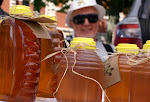When walking through a home, the eye-catching higher end details often stand out. Great hardwood floors. Solid surface counter tops. Wonderful paint colors. Garden tubs. Six panel, solid wood doors.
Don't forget to ask about the things that are not as easy to see. Look for higher end upgrades in energy efficient features. These upgrades in a home will not only improve your comfort, but they also will save you money, making a home more affordable in the long run.
Take a good look at the windows. Are they a basic builder's grade window, or has the homeowner splurged with low e glass and argon fill? Windows can be a source of enormous heat loss in a home, and quality windows are a huge money saver in the long run. There are many different types of windows, and The Efficient Window Collaborative has an informative website explaining some of the differences.
What is the r-value of the insulation? This one is not easy to see, so ask the seller for documentation if they can provide it. Higher r-values make a home less expensive to both heat and cool.
Have the ducts been sealed? Heating and cooling combined account for about 46% of a home's energy cost on average. With a forced air system, ducts that have been sealed and insulated can prevent energy loss significantly.
Check out the efficiency rating for the heating and cooling system. An Energy Star system is one upgrade that will save you a lot of money over the years.
Those stainless steel appliances might look pretty, but will they cost you a pretty penny to operate? Even low end, inefficient appliances are available in very modern and appealing finishes. Look on the sides of the doors for efficiency ratings or write down the model numbers and check them out online after you take a look at a home.
Ask for copies of the seller's utility bills for the previous twelve months. Yes, there are lifestyle differences the can affect energy usage, but at least you will have a ballpark idea of how much your utility costs would be.
If you buy a highly efficient home, you may be able pay for the cosmetic upgrades you want with the money you are saving on your utility bills. The hidden upgrades can save you big money as the years go by!
Showing posts with label energy saving tips. Show all posts
Showing posts with label energy saving tips. Show all posts
Friday, February 26, 2010
Wednesday, June 10, 2009
Energy Saving Summer Cooling Tips
Summer cooling can be as expensive at winter heating. A few small steps can help reduce your energy consumption and lower your energy bills tremendously.
Our grandparents knew the basics:
Our grandparents knew the basics:
- Close blinds and curtains on the east side of your home in the morning and on the west side of your home in the afternoon. This will reduce the amount of solar gain - the energy of the sun entering your home and heating it up. An awning over southern windows can substitute for deep eaves, giving your home shade over these windows and reducing the solar energy coming into them.
- For the long term, deciduous trees planted to block southern or western afternoon sun can help tremendously. The leaves will fall off in winter, allowing for solar gain in the months where we need it the most.
- Turn off lights in rooms that you are not using.
- Open your windows as the evening cools; close them again in the morning. This traps the cool night air in your home, helping it stay cooler all day long.
- Keep doors closed as much as possible during the day. It is the same principle as keeping the refrigerator closed as much as possible during a power outage.
- Use fans to keep the air in your home moving. A fan in an occupied room can make it feel a little cooler. Another option is a whole house fan or attic fan to draw the hot air out of the top of the house. Two of our sellers have these installed in their homes (Monroe and Freeport) and rave about the efficacy.
- Clean the filter on a regular basis.
- Do not block the flow of air from the window unit or central air vents with furniture. Also be sure to keep the air return grills clear.
- Keep the thermostat set at 78 degrees or higher. Each degree higher reduces your summer heating costs by about 7%.
- When it is time to replace an older air conditioning unit, look for high-efficiency units with higher SEER ratings.
Subscribe to:
Posts (Atom)





.jpg)

